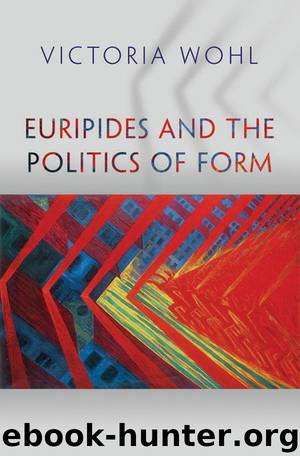Euripides and the Politics of Form by Wohl Victoria

Author:Wohl, Victoria.
Language: eng
Format: epub
Publisher: Princeton University Press
Published: 2015-03-09T16:00:00+00:00
CHAPTER 5
Broken Plays for a Broken World
Suppliants suggests that tragedy, through its psychagogic effect on its audience, can have a real and material impact on the polis. If this is true, then we need to rethink the relationship between the dramatic text and its historical context. The assumption of historicist approaches to tragedy, as we saw in the last chapter, is that the plays reflect (albeit in the distorting mirror of allegory) their contemporary reality. Accordingly, one way in which scholars have tried to make sense of Euripides’ chaotic aesthetics is by viewing it as a reflection of his historical moment. Athens was at war with Sparta from 431 on, and under the strain of that war and its economic hardship, the polis was riven by deep socioeconomic, cultural, and generational antagōnisms that eventually led, at the end of the century, to civil war. On this reading, Euripides’ fractured plots, veering action, and inconsistent tone all make perfect sense as the reflection of a society in which social norms were crumbling and traditional values could no longer be taken for granted. The plays become “seismographs,” registering in their structure the turbulent history of Athens in the last third of the fifth century: broken plays for a broken world.1
Those who see Euripides’ plays reflecting his age often adduce Thucydides and note the strong resemblance between the Athens he describes and the world depicted in Euripides’ dramas. They quote from passages like Thucydides’ description of the stasis (civil war) in Corcyra, a horrifying picture of social disintegration, political corruption, and the corrosion of moral values. This vivid passage is presented as a snapshot of contemporary reality that explains—or explains away—the oddities of Euripidean tragedy: the playwright was merely a faithful reporter, representing the world accurately in all its chaos. Consider this passage from William Arrowsmith’s important article, “A Greek Theater of Ideas.” After quoting extensively from Thucydides’ Corcyrean narrative, he argues that Euripides’ drama is antitraditional because tradition itself was broken:
What Euripides reported, with great clarity and honesty, was the widening gulf between reality and tradition…. That gulf was the greatest and most evident reality of the last half of the fifth century, the dramatic subject par excellence, and it is my belief that the theater of Euripides, like Thucydides’ history, is a radical and revolutionary attempt to record, analyze and assess that reality in relation to the new view of human nature which crisis revealed.
Euripides the reporter merely transcribed his contemporary reality, his disjointed aesthetics a faithful representation of the historical moment.2
Obviously one needs to be careful about taking Thucydides’ history for reality itself: we will see that Thucydides’ narratives are shaped by the very dramatic plotlines they are adduced to explain. But leaving that aside for the moment, we should resist the impulse to explain away the ambiguities of these plays by displacing them onto a putative reality. This approach shifts the burden of interpretation from the poetic text to the historical context, where poetic problems are solved in advance by appeal to the authority of Thucydides and the reality he is assumed to transcribe.
Download
This site does not store any files on its server. We only index and link to content provided by other sites. Please contact the content providers to delete copyright contents if any and email us, we'll remove relevant links or contents immediately.
4 3 2 1: A Novel by Paul Auster(12360)
The handmaid's tale by Margaret Atwood(7744)
Giovanni's Room by James Baldwin(7313)
Asking the Right Questions: A Guide to Critical Thinking by M. Neil Browne & Stuart M. Keeley(5747)
Big Magic: Creative Living Beyond Fear by Elizabeth Gilbert(5735)
Ego Is the Enemy by Ryan Holiday(5402)
The Body: A Guide for Occupants by Bill Bryson(5067)
On Writing A Memoir of the Craft by Stephen King(4924)
Ken Follett - World without end by Ken Follett(4712)
Adulting by Kelly Williams Brown(4558)
Bluets by Maggie Nelson(4541)
Eat That Frog! by Brian Tracy(4508)
Guilty Pleasures by Laurell K Hamilton(4430)
The Poetry of Pablo Neruda by Pablo Neruda(4084)
Alive: The Story of the Andes Survivors by Piers Paul Read(4013)
White Noise - A Novel by Don DeLillo(3998)
Fingerprints of the Gods by Graham Hancock(3982)
The Book of Joy by Dalai Lama(3965)
The Bookshop by Penelope Fitzgerald(3838)
